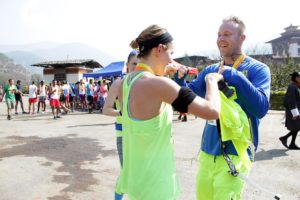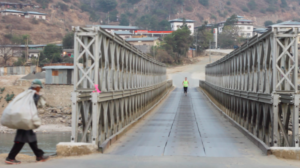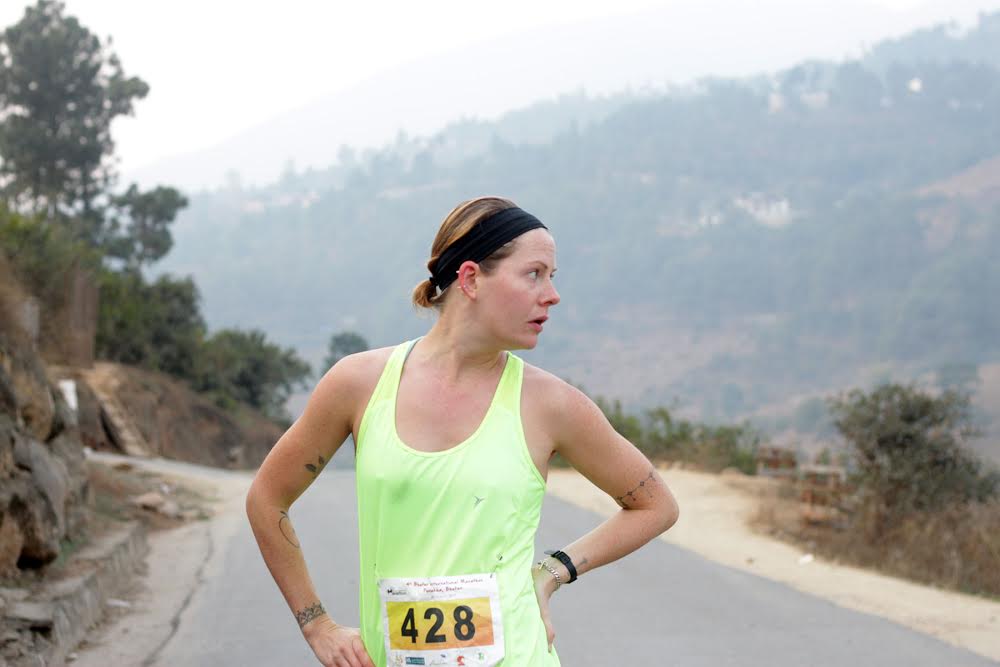‘I’ve always been a fainter’ – Experimental heart surgery and a half-marathon in Bhutan with Scott Jurek
The sensation of coming out of a dead faint never gets any easier. It never gets any less uncomfortable: the disorientation, the slow return to your senses, the wiggling of fingers and toes to ascertain you do, in fact, have fingers and toes. It is as familiar to me as waking up after a restful night’s sleep, with none of the restorative properties.
But today is different because today before I can open my eyes, but after I start hearing the babble of voices overhead, I can feel the ground shaking underneath me with a violence I don’t entirely understand. Shaking, and dipping, and I hear objects hitting walls and clattering, and then I remember, the plane. And then I think, Well, this is new. For all the times I’ve blacked out in precarious places, I’ve never woken up splayed out on the floor of a plane in extreme turbulence, the kind where the flight attendants stay strapped in for the duration of the trip and passengers rethink the concept of air travel.
I recognize the panic in the voices of the people with me. That, too, is familiar, even if I don’t recognize the voices. Someone is jamming their fingers into my neck. Someone is pinching my wrist.
“She’s breathing!” Someone shouts. “I’ve got a pulse!” As soon as I can talk I try to explain as quickly as possible. Heart condition. Pacemaker. High fever and exhaustion from a vengeful mosquito in Nicaragua. Just give me a second, I’ll be fine.
They tell me that after I fainted they couldn’t wake me. They couldn’t find a pulse. No heartbeat. I stopped breathing. We’re close to landing and paramedics are waiting at the gate. I sigh at this. I wish they’d waited for me to wake up, I could have told them not to bother. I am shaky when we land but can stand on my own. I refuse to go to the hospital. The policeman in charge of the pack of EMTs regards me suspiciously.
“If you faint again in the airport you won’t have a choice. You’ll have to go to the hospital,” he tells me.
I wonder how that would pan out if I were to collapse again. I imagine them taking me by force, me swatting at the medics attempting to install me in an ambulance and insisting I can take care of myself. Wouldn’t be the first time.
In the end, I take a cab home alone. It’s the night before Christmas Eve, the same day Carrie Fisher went into cardiac arrest on her flight into L.A., but I don’t know that yet because our incidents occurred almost within the same time frame. When her heart stopped a few days later, they couldn’t get it going again. For me, though, it was business as usual.
I’ve always been a fainter. All my earliest memories are of ceilings, ceilings of my classrooms at school, the ceiling of the house I grew up in.
Ninety percent of the time I was a normal kid, (hyper) active and energetic, with no physical impairment to speak of. But I woke up on the floor from deep, sudden unconsciousness just often enough that those are the moments impressed deeply upon my frontal lobe.
My fainting bouts were a quirk, it wasn’t a debilitating thing, not yet. But when I’d least expect it, I’d find myself toe up on the ground, wondering what in the hell had happened. It didn’t start to get bad until my twenties when the consequences of spontaneous loss of consciousness were higher. I drove my car into a tree at high speed, collapsed on subway platforms, fainted on an escalator into the arms of two teenage boys below me. I fainted in movie theaters and restaurants, abandoned dinners mid meal to lie on the sidewalk outside. I always snapped out of it quickly and got on with it, but when I wasn’t fainting I was busy trying not to, and that is when I started running.
A life-long cavalier attitude towards physical activity turned into a fixation on my own endurance. The urge to run, as many miles as I could, was sudden and acute. My situation did not scream “typical heart condition” – physical ability was one of the things that made me so difficult to diagnose. Doctors applauded me on my slow, level heartbeat, years of tests and emergency room visits yielded nothing. I never had shortness of breath, I didn’t tire easily. If anything, I had too much energy. I got stronger, but at a cost. I could run ten miles, then fifteen, then twenty, but frequently a day later I’d end up in the hospital after my husband found me on the floor, blue lipped and unresponsive. I couldn’t travel alone anymore, couldn’t drive my car. I was afraid to fall asleep at night, afraid to wake up. Always, of everything, I was afraid. I need to run like I need air because it is a reminder of the only moments in my existence that I felt comfort, that I was safe.
But that slow, regular heartbeat was getting slower and turned out to be severe bradycardia. It makes sense now, why the only time I felt normal, was when I was literally running. It’s probably the only time I was getting enough oxygen to my brain. But when my heart slowed down, it crashed. I technically died twice, (that we know of). Once they figured it out, though, things moved very quickly.
There was a new technology under study, a leadless pacemaker. It’s a bitty little thing, smaller than a cashew, and my doctors wanted me to be among the first 200 people in the world to receive one. They don’t even cut into your chest to install it, they feed it up an artery in your leg. It didn’t occur to me to be nervous that I was a medical experiment, a clinical trial, research. It didn’t bother me that no one else was as young as I was. I was only 32, and the average patient was old and infirm and developed late onset arrhythmia because of age or a sedentary lifestyle, They had no clue what my odds were of being helped, but I already knew there were no other options. I already knew if I fell asleep one more time I might wake up dead. I signed a liability contract thick as my thumb and gave myself over to being a cardiac pioneer.
Two years after the pacemaker was installed, I didn’t know the meaning of fear. At least when it came to my physical well-being.
I hadn’t fainted since the day I checked out of the hospital, and I was making up for lost time. Solitary cliff jumping in quarries with no exit route but to scale back up a rock face. Jet skiing with tiger sharks in open water. Borrowing the first surfboard I’d ever touched from a dude I met five minutes earlier and taking it so far offshore I almost couldn’t get myself back. Driving my Miata in a blizzard at night. And, of course, I ran. Running was my return to normality.
I have precious few contemporary idols but if I had to choose one living human I consider an inspiration, it is Scott Jurek, the ultra-marathoner. I mean, sure, the man has shattered world records, has covered more miles on foot than a lot of people have by car and is a mind numbingly impressive athlete. And if he hadn’t accomplished those things and brought the concept of ultra-marathoning to the wider world I wouldn’t be aware of him in the first place.
But I do not run ultras. It is not the specific physical aspects of what he does that I aspire to. It’s the way he talks about it, the way he feels about it. He talks about running like it saved him, and on some smaller scale, with my own version of distance, I know what that feels like. Running is the world’s great leveler. Not everyone can run like Scott Jurek, but almost everyone can run. You can do it without years of training or special equipment. I will never know what an Olympic pole vaulter feels when he catapults himself 19 feet in the air, but when one of the greatest living athletes talks about gassing out on whatever mile because he needs to top off his glycogen stores, I can say, yeah, man, I feel that. (Granted, he’s talking about mile 125 and I’m talking 22, but still.)
When the opportunity came up to travel with Scott and run a marathon with a group of runners in Bhutan, an isolated Himalayan kingdom between Tibet and India, I knew that was supposed to be my next great adventure. I would have the chance to meet and hang out with my idol, run my first marathon post- surgery, and do it in a far-flung location that left no doubt in anyone’s mind that I had zero limitations. People asked me if it was such a great idea if I should be putting my body through such a risk. I couldn’t understand their point because to me, the whole reason for having life-altering surgery was to be able to do whatever you wanted afterward. It did not occur to me to be afraid.
A couple of months before we were slated to leave for Asia, I went to South and Central America with my brother for two weeks. The humidity was stifling, the temperature oppressive, and the climate was nothing like it would be in the Himalayas, but it got me used to the idea of training outside my comfort zone. Five miles down there felt like ten.
I was standing on a putrid dirt path in a jungle in Nicaragua when the nice English woman I was touring with swatted me hard between my shoulder blades.
“Oh no, love,” she said, her face red with heat and concern. She held up her hand, the smashed mosquito a smear of blood on her palm. “I got him but I think he bit you first.”
Two days later I was so sick I was sure I was going to die. My fever was so high I was hallucinating, I poked curiously at the red rash on my neck that sprouted out of a sunburn. I was too weak to call my brother in the next room, my bones felt like they were splitting apart from the inside out. I had never felt so much pain in my life.
“This is it,” I thought deliriously, my cheek cemented to the bed. “This is how I’m going to go.” But when morning came I boiled tea bags and rested them on my dragon-red eyeballs until I could pry them open. I didn’t want anyone else to know I was sick, I was terrified I wouldn’t make it through immigration if I tested positive for Zika. I’m pretty sure I was paranoid and delusional, but there’s nothing you can take for Zika anyway, and we were scheduled to fly home in a couple days.
It was too much. 36,000 feet in the air, I was dehydrated, exhausted, feverish, over-trained and sun-stroked, and halfway through the flight- there it was. The all too familiar spangling stars that crept into my vision and numbed my fingers and obliterated function. I knew I had less than five seconds to get out of my seat and lie on the ground before everything was black.

My best friend Alex and I have met up with the marathon group in Thailand and found our way into the obscure little country of Bhutan.
I’ve promised my cardiologist that I would only run a half instead of a full marathon. I’m not saying you can’t ever run a full again, he’d told me, just maybe don’t make your first one with a pacemaker on the other side of the world.
This was fair. I am disappointed, but part of me is relieved to have this sensible limitation because I have spent the last two months in an icy block of fear. Alex is relieved. After all, I had fainted. My heart had stopped. But I was committed to this trip in more ways than one, and grappling with the sense that I would never be safe again. All the progress I’d made was gone. I was 34 now, and once again, afraid to drive at night. I was afraid of how I was going to get through the 36-hour journey to Asia, of how I would perform with foreign food and jet lag, in extreme elevation. After so long feeling invincible, my victory trip was now an abyss of physical and emotional tests I was sure I would fail.
But we’re here now. and I’m surprised that I feel kind of amazing. Alex and I ate our way through Bangkok, wandered into a hut and ended up with two Thai masseurs that pulled our ears and jammed their thumbs into our eye sockets and left us feeling like our souls had come out the other side and were better for it. And now, we’re in the mountains and she’s watching me lace up my running shoes for the first time. Scott Jurek introduced himself to our group at lunch earlier and has invited everyone for a shake-out run to the top of a neighborhood cliff.
My friend Oliver is here, he lives near me in Brooklyn and has legs that go up to my neck. He unsurprisingly breaks to the front of the pack and for some reason, I’m able to keep up with him, but only because he’s been nursing a hip injury and probably shouldn’t be running at all. We’re not talking much because the elevation is like nothing I’ve ever felt before. It is like trying to push through a building. We’re at about 8,000 feet and at times I feel like I’m running in place. But the air is so crisp, so dry, that I can’t feel that I’m sweating. I don’t even feel thirsty.
“Careful,” Oliver warns me. “You feel so good you don’t drink anything, and before you know it you’ll pass out.” This terrifies me far more than Oliver is aware of and I gulp a whole bottle of water without breathing. We make it to the top of the cliff first out of our group.

At dinner that night is our new friend, Jack, who we’ve just met and who is from South Boston. He fist-pounds me.
“You’re a f**ing rahkstah, J,” he says, sounding more like Matt Damon than Matt Damon. “You were my f**ing hero today.” I don’t know how to tell him I was shocked to be my own f**ing hero today.
In the shower that night I wash off the crust of dried salt on my skin. I’m not fully acclimatized to the elevation yet and sometimes it catches me off guard. I get out of breath while washing my hair and have to rest my arms.
Scott talks to us about anything we want to know, he answers questions about nutrition and physical therapy and mental tenacity. Outside of introducing myself, though, I keep my distance because, quite frankly, he makes me nervous. The man is my Agassi. (I mean, Agassi is my Agassi, too, but I’m not going to find myself on a court with him anytime soon.)
But when a small group of us takes a short run, he falls into pace beside me and we chat like normal. After a few miles, he asks me if I feel like we’ve gone far enough and I think, did he just ask me my opinion? I refrain from saying, Yes, Scott Jurek, I think we’ve gone far enough. I just say, sure, let’s turn around, and we do.
The morning of the race I wake up into the darkness at 4.30 am. We’re in deep, quiet hill country and the pre-dawn stillness is so isolating it feels exotic. The sun is rising when we catch a rattling old school bus to the site, and the usual brackish stomach water of pre-race nerves is curiously absent. I feel good. But halfway through the ride, Jack tells me I’ve put my clothes on inside out and I have to duck down between our seats and redress myself, so maybe I was more distracted than I thought.

People have gathered in the city of Thimphu from all over the world to run the Bhutan International Marathon, (and half). The course is laid out so we’re running down the face of a mountain for much of it, through valleys that cover farmland and streets that run through the village. The way the trail dips, there are times where I am entirely alone. I run under the cover of mountains that loom thousands of feet over my head and over a bouncing 500-foot suspension bridge that’s made some of the other runners stop altogether to grip its sides. A pack of wild puppies run with me for half a mile and nip at my ankles. The narrow roads don’t officially close for the race and I run directly through a minor traffic ruckus involving three cars and a cow in the center of town. I run my hand along the length of the cow’s dusty side as I squeeze past her.
I am surprised when I see the finish line, (which, incidentally, is an ornate, carved temple arch I run through), and hundreds of locals jumping up and down to greet me. I am much more surprised when one of the race officials pushes a medal into my hand and tells me I am the first non-Bhutanese woman to cross the finish line. At the awards ceremony that night, there’s a dais set up on the bank of the river and the whole town is there. Everyone is eating the local pastry they’re passing around, runners nursing wobbly legs and low blood sugar. A serious wind has kicked up and is whipping people around the huge striped tents we’re gathered under.
My friends are better at math than I am, they already know I’ve finished 5th overall for the women’s half, and they laugh at my shock when my name gets called. I go up to receive my prize from a local dignitary and stand next to the four women who finished before me, the only one with fair hair and blue eyes and not dressed in traditional striped kira. I try to bow to them as beautifully as they do to me, but there’s a lifetime of grace behind their movements and I’m just a visitor here.
There was a time that standing in front of a crowd for an extended period of time would have struck me down with sheer terror. But today it feels ok, today I feel nothing but a little stiff in my muscles, and I don’t faint.
My pacemaker is not a magic cape. Having one does not make me invincible, just like blacking out when I am sick and exhausted and traveling does not mean I’m subjected to a life of falling on the floor. Over the years, I got used to the idea that any little thing, what would be an inconvenience for anyone, was for me, an extraordinary setback and life threatening. It’s taking me some time to recalibrate, to wrap my head around the fact that something bad happened in Central America, but nothing bad happened in Asia, and that neither was a given. From there, If I can find my middle ground, the place where I recognize that extreme things happen to everyone and it doesn’t have to end you, then maybe the strength of my mind will catch up to the strength in my legs, and I’ll have a decent shot.
About the writer
Janet Mercel is a copy + content writer living in Brooklyn. Born in Rhinebeck, NY, she splits her time between Downstate and Upstate, and just completed the manuscript to her food + recovery memoir with the aid of long-time friend and editor, Beth Daugherty of Bauer & Dean Publishers. You can follow Janet on Instagram for updates on her coming book.
Find more of photographer Alexandra Marvar’s work on Instagram and the web.


What a super story! My favorite line: “The man is my Agassi. (I mean, Agassi is my Agassi, too, but I’m not going to find myself on a court with him anytime soon.)”
I’ll be looking for her book. Thanks for featuring her.
Cheers, Peggy! We’re stoked to read Janet’s book, too! 🙂 Thanks for reading! – Hatie